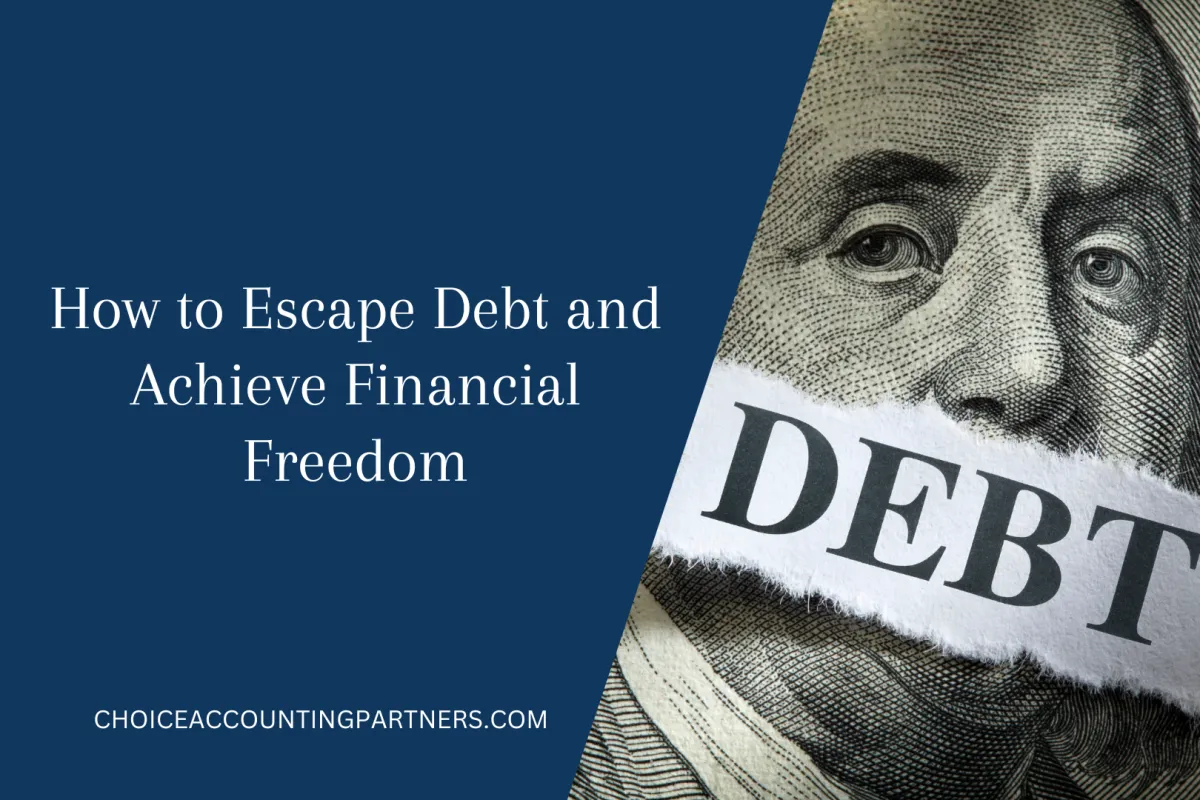

ON THE BLOG

How to Escape Debt and Achieve Financial Freedom
How to Escape Debt and Achieve Financial Freedom
Introduction:
Debt can feel like a heavy burden, but with the right strategies, it’s possible to break free and regain control of your finances. At Choice Accounting Partners, we’ve helped countless individuals break free from debt, and we’re here to guide you through proven methods that can help you, too. Let’s dive into the steps you can take to eliminate debt and build a stronger financial future.

Step 1: Face Your Debt Head-On
The first step to overcoming debt is to confront it honestly. Many people avoid looking at their debt because it feels overwhelming, but ignoring it only makes the problem worse. To take control, you need to understand exactly what you’re dealing with.
Create a Debt Inventory
Start by listing all your debts. Use a format that works for you—a spreadsheet, a notebook, or even a note on your phone. For each debt, include:
• The creditor’s name
• The current balance
• The interest rate
• The minimum monthly payment
This exercise might feel intimidating, but it’s a crucial first step. Remember, your debt doesn’t define you. It’s just a financial challenge that you can overcome with time and effort.
Calculate Your Debt-to-Income Ratio
Understanding your debt-to-income ratio (DTI) can help you gauge your financial health. To calculate it, divide your total monthly debt payments by your gross monthly income. For example:
• If you earn 5,000 per month and have 2,100 in monthly debt payments, your DTI is 42%.
Here’s a quick guide to interpreting your DTI:
• Over 40%: Danger zone
• 30%-40%: Higher than ideal
• 20%-30%: Manageable
• Under 20%: Ideal
Step 2: Choose a Debt Repayment Strategy
Once you’ve listed your debts, it’s time to decide how to tackle them. Two popular methods are the debt snowball and the debt avalanche.
• Debt Snowball: Focus on paying off your smallest debt first while making minimum payments on the others. Once the smallest debt is cleared, move to the next smallest. This method builds momentum and motivation.
• Debt Avalanche: Prioritize debts with the highest interest rates. This approach saves you money on interest over time but may take longer to see progress.
There’s no one-size-fits-all solution. Choose the method that aligns with your personality and financial goals.
Step 3: Explore Debt Consolidation and Refinancing
Before diving into repayment, consider whether consolidating or refinancing your debts could help.
Personal Loans
A personal loan can simplify repayment by combining multiple debts into one monthly payment. It may also lower your interest rate, saving you money over time. However, qualifying for a loan requires good credit.
Balance Transfer Cards
If credit card debt is your main issue, a balance transfer card with a 0% introductory APR can help you save on interest. Be mindful of transfer fees (typically 3%-5%) and avoid using the card for new purchases.
Refinancing Options
Refinancing student loans, auto loans, or even mortgages can reduce your interest rates and monthly payments. However, extending the loan term may increase the total interest paid over time.
Step 4: Free Up Cash for Extra Payments
To accelerate debt repayment, you’ll need to free up extra money. Here’s how:
• Cut Expenses: Review your budget and identify areas to cut back. This might mean dining out less or canceling unused subscriptions.
• Use Windfalls Wisely: Allocate bonuses, tax refunds, or other unexpected income toward debt repayment.
• Increase Payments: Even small increases in your monthly payments can significantly reduce your repayment timeline.
For example, paying 500 instead of 300 on a $15,000 loan at 5% interest can shave nearly two years off your repayment period.
Step 5: Boost Your Income
Living below your means is crucial, but earning more can make debt repayment even easier. Here are some ways to increase your income:
• Take on a Side Hustle: Consider part-time work, freelancing, or gig economy jobs like driving for a rideshare service or delivering food.
• Sell Unused Items: Declutter your home and sell items you no longer need online or at a garage sale.
• Pursue Career Growth: Seek promotions, ask for raises, or explore higher-paying job opportunities in your field.
Every extra dollar you earn can be put toward paying off debt faster.
Step 6: Seek Professional Help if Needed
If you’re struggling to manage debt on your own, consider seeking help from a reputable credit counseling agency. These organizations can help you create a debt management plan and negotiate with creditors.
Avoid:
• Debt settlement companies that promise to reduce your debt but charge high fees.
• Services that require upfront payments or make unrealistic promises.
Final Thoughts
Escaping debt is a journey that requires discipline, patience, and a clear plan. By facing your debt head-on, choosing the right repayment strategy, and making smart financial decisions, you can achieve financial freedom.
As a financial advisor, I’ve seen firsthand how transformative it can be to break free from debt. It’s not always easy, but the peace of mind and financial stability you gain are worth the effort. Start today, and take the first step toward a brighter financial future.
Need expert guidance? Our team at Choice Accounting Partners specializes in helping individuals and businesses take control of their finances. Book a consultation today and let’s create a plan tailored to your needs: Click here to schedule an appointment.
Follow us for more financial tips and strategies! Share this with someone who needs to hear it. 💻📲





